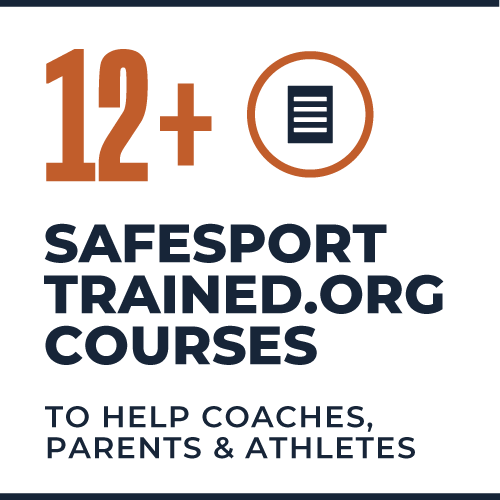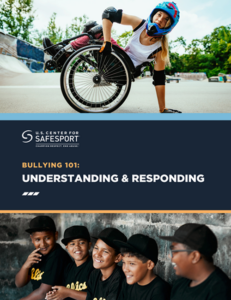
Join our email list!
Stay connected with the latest news, resources, and tools from the U.S. Center for SafeSport and enjoy our quarterly e-newsletter, The Gameplan.
Check your email inbox to confirm your U.S. Center for SafeSport Gameplan newsletter subscription.
Coaches have the power to create safer environments where athletes thrive.
The U.S. Center for SafeSport—an independent nonprofit committed to ending and preventing emotional, physical, and sexual abuse—can help you prioritize positivity and belonging. Join us in shifting sport culture.
Lead with trauma-informed coaching practices that put athlete well-being at the center of sport.

A National Survey
Do you know about our Athlete Culture & Climate Survey? In 2024, we surveyed more than 4,000 athletes to learn about their experience in sport, especially when it comes to emotional, physical, and sexual abuse. Explore our results and learn how these findings can serve as a tool to help all of us understand ways the culture of sport needs to change.
Coach faqs
What Coaches Should Know About Abuse In Sport
Physical, emotional, and sexual abuse and misconduct can happen in any sport. It is most often perpetrated by people we know and trust, like coaches, trainers, or teammates. Research suggests that abuse and misconduct are often based on power differences in sport environments or in society. For example, adult coaches have more power than youth athletes because of age and authority.
Being able to recognize abuse when it happens is an important part of being able to prevent it. Our SafeSport courses give in-depth definitions for each type of abuse that can help you identify and respond to them. The courses will also help you understand what factors can increase the risk of abuse—such as one-on-one interactions between adults and youth. Our Minor Athlete Abuse Prevention Policies (MAAPP) can help you learn more about how to limit one-on-one interactions in high-risk situations, like when athletes are changing, traveling, or receiving therapy.
As a coach, your attitude and actions provide a model for your athletes. Some ways you can help prevent abuse include:
- Calling out abusive behaviors from coaches, trainers, other staff, parents or other spectators—and being clear you will not support it.
- Creating a safe and supportive environment by letting athletes know that you will not tolerate bullying, harassment, or hazing.
- Ensuring all coaches, trainers, and administrators know that they are mandatory reporters who must report all known or suspected child abuse.
- Following and enforcing policies limiting one-on-one interactions between youth and adults.
- Advocating for everyone in your sport organization—coaches, trainers, parents, and athletes—to take abuse prevention training.
Conversations about abuse and misconduct aren’t easy or comfortable, but they are important. Being frank about these topics lets athletes know that their safety and well-being is most important to you.
- Clearly state team expectations about respectful communication.
- Model the behavior you expect from them.
- Remind athletes not to engage in abusive behaviors like sexual misconduct, emotional misconduct, bullying, hazing, and harassment.
- Encourage children and family members to speak up when they have questions or concerns. Have a clear policy for families to follow.
online trainings
Explore trainings created to support and educate coaches. Get SafeSport® Trained and join our growing community committed to keeping kids safe in sport.
We also offer live and on-demand trainings to educate and inform coaches on best practices in abuse prevention.


Coach Resources

Understanding Team Climate
Explore questions you can ask to assess your team climate and pinpoint potential warning signs.

Bullying 101: Understanding & Responding
Download our quick reference guide to help you understand bullying, including sport-specific examples, tips for responding, and what not to do.

Tips for Creating a Positive Team Environment
Learn how to foster an environment of belonging where athletes feel supported and encouraged to perform at their full potential.
Join Our Email List

Stay connected with the latest news, resources, and tools. Get our quarterly e-newsletter, The Gameplan, delivered to your inbox. JOIN TODAY

